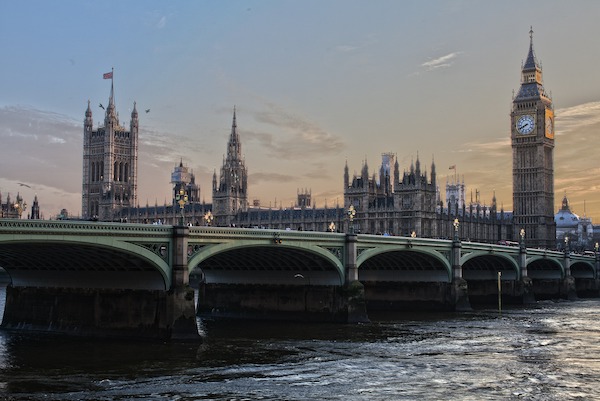

The government economic advisor widely regarded as being the architect of Jersey's finance sector has said that the island's position on public registers of company ownership is actually 'not yet' - rather than a flat 'no'.
Brexit hasn’t been the only major debate in Westminster that has suffered a variety of false starts in recent months. Moves to force the Crown Dependencies to publish registers of company ownership have almost made it to the debating chamber twice, before retreating – but definitely not going away.
It seems that a growing group of influential MPs - including former ministers and party leaders - are supporting the moves, and sooner or later, Jersey will have to agree; and that debate is being played out against a backdrop of constitutional law, and what the UK can, and can’t, force the Crown Dependencies to do.
Jersey’s position remains a ‘not yet’, arguing the need for due process, and pointing out that it already exchanges better information than would be contained in a public register with law enforcement officers, on request. So just as the UK’s relationship with the EU is under intense scrutiny, so is Jersey’s relationship with the UK.
Express spoke to Colin Powell, long-term advisor on international affairs to the Chief Minister, and the External Relations Minister, and asked him...

Pictured: Colin Powell has been a long-term advisor on international affairs to the Chief Minister, and the External Relations Minister.
CP: Well, we would hope that we have sufficient arguments. As you say, the first point one could make, obviously, is the constitutional point. First and foremost, a key example of this was the Kilbrandon Commission in 1973, but even going back into the 19thCentury, when the States contested the wish of the UK government to make orders in council.
I believe, more recently, in ministerial statements, it's been made very clear that the UK government would not legislate for the island without proper consultation, and also that the established constitutional relationship was that they would only legislate where there was a problem of good government, or a breakdown of law and order.
There was a clear recognition that the islands had domestic autonomy, particularly in respect of taxation. So, on the constitutional situation, there is the big question as to is the proper process of consultation being undertaken? Secondly, is what is being expected in terms of the requirement for ordering council to provide for the public registers, fitting in with that underlying principle that the UK does not legislate, other than in respect of measures which relate to good government and law and order?

Pictured: It's been made very clear that the UK government would not legislate for the island without proper consultation.
CP: Well, as I say, I think there aren’t a lot of tests, obviously, over the years. The Kilbrandon Commission said that it would be exceptional, and I think one can take out of that that that's what it would be, it would be exceptional. So, it wouldn't be run-of-the-mill type situations, and I think there would be some who would obviously want to question whether what is now being proposed, or what is now being asked of us, fits into the category of exceptional?
There was a question asked in the House of Lords, which was answered by Lord Bach, he was asked by another peer as to how good government was defined. This is where, again, he said it was exceptional circumstances.
I think what we would see as being a most important aspect, is to get the message across to those who are supporting the proposal in the UK parliament, get the message across as to what we are doing already in providing information to the National Crime Agency and how satisfied the National Crime Agency is with what we're doing in terms of providing them with beneficial ownership information.
That's reflected in the ‘exchange of notes’ arrangement which we have, where they can get information from us within 24 hours or, in some cases, within one hour. That's pretty exceptional in itself, that's not the kind of information arrangement they would have with any other country.
That is much more comprehensive information, and much more effective information, than they would find on a public register if that public register, was akin to the UK public register.

Pictured: Mr Powell says Jersey would be "very happy" to participate in discussions about a new international standard in respect of public registers.
So, I think that we feel that there is a need to get the message across there's a lot to be done, but in terms of satisfying the proposers, I mean, I think we need to talk very much about what we are doing as well, so how we see the future and there we've got a number of points that we would make.
One is that we are actively engaged in working with the international organisations in the development of international standards, we've done that for many years.
Insofar as developing a new international standard in respect of public registers, then we have indicated that we'd be very happy to participate in those discussions, and that's with organisations such as the Financial Action Task Force and the Global Forum on Transparency and Exchange of Information for Tax Purposes. So, we're doing that.
The other thing that we have said that we are proposing to do is to consult with industry on how we should respond as, again, we've responded on many occasions in the past in pursuit of our good neighbour policy with the EU.
The EU have got proposals through their anti-money laundering legislation, or directive, for implementing public registers by the end of 2020, but we've said we will have a consultation exercise, get the industry's views as to whether there would be a case for matching that, not necessarily at exactly the same timescale, but matching it in the same way that we have done that with other matters relating to the EU.

Pictured: The EU have got proposals through their anti-money laundering legislation, or directive, for implementing public registers by the end of 2020.
That, again, reinforces the constitutional point, because if you go back to 2004 to 2005, when the EU were very keen that we should support them on the taxation of savings income, they enquired, I think, then as to whether the UK could require us to do that and the UK, I think it was Dawn Primarolo at the time, made it very clear in responding to the EU that they didn't have the constitutional power, as it were, to legislate for us on tax matters, but that they would talk to us about participating, and we did agree to participate on a voluntary basis.
So, the same kind of situation could clearly prevail in respect of this current measure, so we want to get that message across.
The other is that we are in constant contact with the National Crime Agency, and if there was any indication from the National Crime Agency that there was more information that they required, or that they felt they weren't getting information that they should have, and our ‘exchange of notes’ arrangements are subject to regular review, then we would be, obviously, happy to respond to that.
So, there are a lot of things that we would hope to be able to put to those who are proposing it, which would persuade them that there's no need for immediate action, you know, let these things unfold. We've got time, because no one's expecting anything before the end of 2020 and there is the issue with the overseas territories as to whether it's 2020 or 2023, so there is time for us to have those discussions with the UK government and also with the proposers of the amendment.

Pictured: Mr Powell says Jersey hopes to convince people the island is very actively involved in pursuing international standards.
CP: No, I think, for the reasons that I indicated, we would hope that we would convince people that we are very actively involved in pursuing these developing international standards, that we are pursuing a good neighbour policy with the EU, and particularly a good neighbour policy with the UK and that, through our relationship with the law enforcement authorities and others, we are making a contribution.
We are not pushing them, we are actually seeking to get the message across that we are a contributor, that we are a participant in this process, and what we feel is that there is a lot that we can achieve and can be achieved through a dialogue. So, I don't think that we are pushing the UK government into a position where it would feel that it needs to act in a heavy way.
CP: Yes, but I think the political ambition there is one which really started off, I think it goes back almost to 2013, and the G8 meeting in the UK, and was reinforced by the 2016 anti-corruption summit meeting that the UK held.
The UK is very keen to promote the idea of public registers internationally, and clearly they, in seeking to convince other countries that this is something that should become an international standard, it would help them if they could point to the work that is being done by their own dependencies in pursuing that course of action.

Pictured: "The UK is very keen to promote the idea of public registers internationally."
CP: Yes, I think that is probably an accurate description. I mean, I think I probably can speak for the industry as well, I think we recognise that this is the direction of travel.
Transparency is seen as central to the action to be taken against financial crime in all its forms, and no one denies that. I think it's more a case of working within the framework of an international consensus and having a level playing field, working against the framework of our good relationship with the UK and the EU, so I don't think there's any disagreement about the end objective, it is very much a question as to how we move to that position.
At this point in time, we don't even know how well the EU member states are going to perform in terms of implementing the directive. They've been given until the end of 2020.

Pictured: Mr Powell says the information available in public registers is "much more limited" than what authorities need to pursue those engaged in financial crimes.
There were a number of countries who had not implemented the anti-money laundering directive number four, and action's been taken against them. We're waiting to see exactly how some of these countries are going to approach the provision of a public register.
There are some countries, like Germany, who have always been very intensely protective of personal privacy, a kind of reflection of their past. So, it'll be useful to see exactly what they are going to do in terms of producing a public register, so we can have a better idea as to what we need to do if we're going to be working in a way that matches what is being done in the EU, if that is decided to be the course that we want to follow.
CP: The problem is that the information that is available on the public register is much more limited than that information that the law enforcement authorities need to really pursue those that are engaged in financial crimes, so they need to get that information from us, which is what they get at the present time under the other arrangements.
So, there is an issue there, I suppose, as reflected in the fact that sometimes people ask, 'Well, why isn't there an international standard for a public register at the present time? I think, probably, it's because the law enforcement authorities who would make up the parties that would be involved in developing that international standard within the Financial Action Task Force, for example, see that their need of accurate, adequate and timely information is better satisfied through effective cooperation agreements with other jurisdictions than it is through a public register.

Pictured: "I think that we have enhanced our reputation very considerably in recent years."
CP: Well, I think that's, to some extent, a cross that we have to bear, given the nature of our jurisdiction and it's something we are always having to battle against, but I think that we have enhanced our reputation very considerably in recent years, and I've certainly noticed a change of attitudes and views amongst those representing their jurisdictions in international bodies, a real change in their view of us, because of our compliance with the international standards and the fact that we are, you know, a leader.
We've been one of the early adopters of things like the Common Reporting Standard, which is automatic exchange of information to countries worldwide, and the exchange of notes provision. So, I think that there is a change of view, but at the same time, it doesn't stop us quite regularly being exposed to these kinds of situations. I don't think that's going to change in the foreseeable future, but we're contending with them.
Comments
Comments on this story express the views of the commentator only, not Bailiwick Publishing. We are unable to guarantee the accuracy of any of those comments.